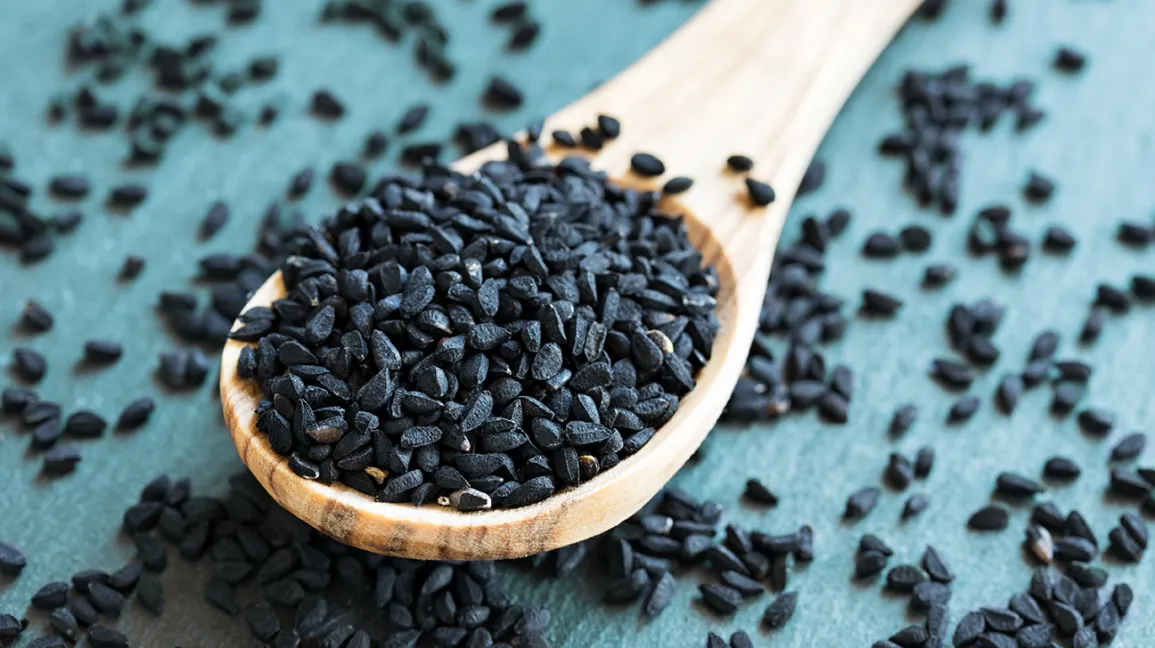The nigella sativa is also known as “Kalwanji” and is helpful in treatment for worms and also applied to the skin to prevent skin eruptions.

Nigella sativa is a plant with great medicinal value. It is an annual flowering plant in the family Ranunculaceae, native to Eastern Europe and Western Asia but naturalised over a much wider area, in North Africa, part of Europe, and east to Mynamar. It is used as a spice in many cuisines and dishes and also has great importance in the medical field.
The dry-roasted seeds flavour curries, vegetables, and pulses. They can be used as a seasoning in recipes with pod fruit, vegetables, salads, and poultry.
In some cultures, the black seeds are used to flavour bread products and are used as part of the spice mixture panch phoron (meaning a mixture of five spices) and alone in many recipes in Bengali cuisine, most notably in some variations of naan. In Palestine, the seeds are ground to make bitter qizha paste.
Its many uses have earned Nigella the Arabic approbation ‘Habbatul barakah’, meaning the seed of blessing. The tincture or powder prepared from the seeds is very helpful in indigestion, dropsy, amenorrhea, dysmenorrhea, diarrhoea, etc.
The nigella sativa is also known as “Kalwanji” and is helpful in treatment for worms and also applied to the skin to prevent skin eruptions.
Nigella sativa plant is rich in the potent antioxidant thymoquinone, which has anti-inflammatory properties and prevents inflammation in organs.
It is also used for cholesterol control. People with cholesterol problems use Nigella sativa, which helps them control their blood cholesterol level. It has been found that Nigella sativa oil is better than its seed powder.
Studies have shown that Nigella sativa has antibacterial properties and can kill bacteria by fighting with them. So it is also used as an antibacterial to prevent bacterial infections.
The liver is an incredible organ. It removes toxins, processes nutrients, and produces proteins and chemicals that are crucial to health. Many researchers have shown that Nigella sativa is also helpful for treating diabetic patients. It has the ability to control the blood sugar levels of patients.
Stomach ulcers are a painful source due to eating spicy food. It is seen that Nigella sativa is helpful in treating stomach ulcers and sores. It is easy to add Nigella sativa, known as Kalyanji, to our routine by mixing it with onions. Add oregano. Nigella sativa is also known as black cumin seed.
Black cumin seed is also preferred by our Holy Prophet (PBUH). The black seeds were referred to by Prophet Muhammad (PBUH), who once stated, “The black seed can heal every disease except death”.
It was revealed that the crude oil of N. sativa has chemo preventive potential for cancer cells. Administration of 1000 or 4000 mg/L N. sativa volatile oil in the diet of male Wister rats for 30 weeks significantly reduced malignant and benign colon tumour sizes, incidences, and multiplicities.
The results of their experiments indicate that a dose of 2 g/day of N. sativa might be a highly beneficial adjuvant to oral hypoglycemic agents in patients with type 2 diabetes. The combination of lipoic acid, carnitine, and N. sativa can contribute to the improvement of carbohydrate metabolism in diabetic rats.
Thymoquinone is present in N. sativa, and it has been proven that thymoquinone has the ability to improve hepatic enzyme activities and thereby exert its potential antihyperglycemic effects.
Kalonji is used as a remedy for numerous health problems, such as:
Cholesterol
High blood pressure
Inflammation
Congestion
Rheumatoid arthritis
Asthma
Dental issues
Menstrual disorders
Black seed oil, extracted from Nigella sativa, also has several applications and benefits for problematic skin conditions. It is used to treat acne, hydrate hair, and psoriasis, and is a natural cosmetic for skin softening, wound healing, skin protection, etc.